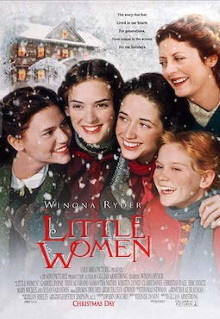
This is one of those films that really need its year of release appended to its title because it’s been made and remade so many times. I suppose the original 1868 novel by Louisa May Alcott is just that beloved. In fact yet another adaptation is due to be released later this year, directed by Greta Gerwig. Still, for now at least this 1994 version featuring multiple performers who would later become very well known, should be the standard bearer.
In the midst of the American Civil War, a mother Marnee raises her family of four daughters, Meg, Jo, Beth and Amy, alone while her husband is at war. Though their finances are strained, they try to keep their spirits up and even help a poor immigrant family from Germany. Living next door is the wealthy Laurence family and the grandson Laurie soon becomes a member of their group, joining in with their performances of plays written by Jo who aspires to be a writer. The family gets a scare when the father is injured and they have to raise money so that Marnee can travel to see him. But life goes on and eventually Meg falls in love with Laurie’s tutor, Laurie himself proposes to Jo who rejects him along with other episodes of daily life in 19th century America.
This is one of those sweet sentimental films that though it chronicles the ups and downs of family through difficult times, you know in the end that all will be mostly well. The real draw here is that it presents life from the perspective of women, so this is in a way the American version of Jane Austen. This is made especially interesting in that the March family is portrayed as holding on to progressive values due to the transcendentalist beliefs of the parents, much like Alcott herself. This explains some of their reduced circumstances as the father’s school was forced to close due to his insistence on allowing colored students for example. Similarly Jo wishes more than anything to be allowed to go to university while Meg feels torn about her friends’ wealth and the glamorous life they lead though she knows it comes from unethical sources. The sisters are all well educated and though the youngest Amy proclaims that she will never marry a poor man, are portrayed as morally upstanding people.
Unfortunately Little Women is also often described as the beginning of the so-called chick lit genre due to its overly idealistic and sometimes juvenile view of life. For all of the romance in Austen’s work there is a hard edge in them that is absent here. While there is sorrow and tragedy, the emotional focus here is solidly on forging Hallmark-style happy memories. It doesn’t help either that this film coasts too quickly through several years of the lives of its multiple characters, giving the impression that we’re just watching the highlight reel. One symptom of this how the women are all about missing the father of the family when he is away but he is almost completely absent in the story once he returns. I think a television series would have worked better by giving each character enough space and time to properly develop their individual arcs.
You can understand from this adaptation why the original novel is still so beloved today and it does make for a pleasant watching experience. But it is too sweet and simple to make for a very good film. From what I’ve read the 2019 version will try to focus on the lives of the characters as adults which may well make it more interesting. We’ll just have to see.